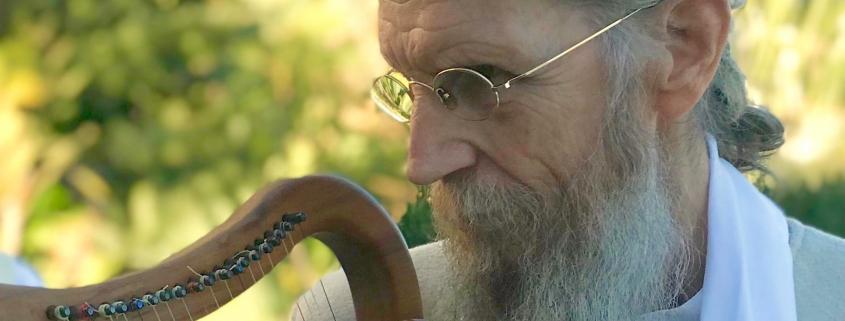Yoginâm's Magic Harp
Yoginâm 's Magic Harp
According to Yoginâm, people suffer from false identities: they say “I am a Muslim” or “I am a Christian” or “I am an Atheist” or “I am a Buddhist” but also “I am a feminist” or “I am socialist” or “I am gay” or “I am a liberal” or “I am an academic” or “I am a worker” or “I am a woman” or “I am a man”. There is an endless list of false identities that people claim for themselves.
There is nothing essentially wrong with that. It is however never your identity, it is a false identity. It is not self evident and therefore you have to defend it, or remind yourself of it, or express yourself as it. It becomes an occupation to uphold your false identity. This is what is also called Ego.
Such a false identity always involves Habitual Programmes of Perception. You try to create your world on the basis of your false identity. You will however often discover that the world does not always respond in the way you expect it to, on the basis of your false identity.
This creates stress, anxiety and disease. The more society collectively activates people, from an early age onward, to develop false identities, the greater the social and individual problems. This gives an income to psychiatrists, therapists and physicians. Again I think that there is nothing essentially wrong with that, it is the characteristic of society: ‘it makes the world go round’.
However there are people who increasingly doubt this state of affairs, and I believe that those who start to question it are also those who are meant to question it. They have a different task in life. There are ancient spiritual groups who assumed it was thanks to their daily ritual or prayer that the sun would rise. This is a metaphorical expression of the same. Those who question it are meant to be the Carriers that ‘carry’ the realisation onward, as a kind of continuum or continuous base tone that you can hear in oriental music, they provide the stable backbone around which the world weaves itself in endless variety.
The false identity is totally unimportant for such Carriers, who are involved in the search for what it means to be human. People often assume that such a spiritual search is for their benefit because it would lead them to become enlightened. This is an illusion. The real human nature is its transcendental nature, and that lies beyond the false identity, beyond the ego-illusion, beyond anything to become: in short beyond being an individual as an identification.
Of course you are an individual, but that is ‘the end of the line’. Your true nature is the incomprehensible oneness, or Abbah, of which this ego-illusion and its world is an expression. When you experience stress, anxiety and disease, there is something wrong with your relationship with the world, and that is invariably caused by the false identity that you impose on the world.
Letting go of the ego-illusion means letting go of your false identity. It does not matter whether you are straight or gay, black or white, a king or a pauper, religious or secular, follower of this or of that sect, or perform these or those meditation exercises. These are often actually the ropes that bind you to your false identity. What matters is living your true identity. It implies living in the identity of Abbah, living your transcendental nature.
Yoginâm developed LivingNâm lifestyle for the modern human being who lives in a globalising world that is developing towards cooperation and shared living. Power struggles and ‘tribal’ domination of one over the other are anachronistic to a global world. It does not matter who wins or who dominates: what matters is how we all survive.
LivingNâm is the pure expression of the primordial endeavour to live in the essence of living. It is not coloured by distinct cultural mythology or history. It is timeless and ageless. It is rooted in the complete realisation of being human as it unfolds by means of a spiritual phenomenological way of analysis.
Yoginâm's message is as simple as it is profound. It involves a shift away from the false identity to the true identity of human living. Becoming is replaced by being. Soul is replaced by Heart; the drop identity is replaced by a water identity, rationality and emotions are replaced by a silent and unmentionable awareness for which there are no words. This can be compared to the silent moment in which the Zen monk demonstrates to his master that he has grasped the meaning of a Koan.
HarpMood
Long ago there was a Sufi master who used an ancient string instrument during his teachings. Because music was frowned upon by a fundamentalist emir of the city, he was about to be judged by the court. During the court case he was told to present the evidence, therefore he started to play as a demonstration, but while he played, in response to the sounds of his instrument, everybody in the court fell into a deep sleep. Upon which the Sufi master took the chance to pick up his instrument and flee the city, escaping thereby his conviction.
Words are generally understood with the programmes of the false identity. Unless you are a trained musicologist, which in this sense is an obstacle, when you listen to music the false identity is circumvented. You cannot listen with your consciousness alone, nor with your emotions alone, really listening to music involves the ‘all’ of you. When the listener is lost, Abbah is listening to itself.
This is why the HarpMood of Yoginâm is a teaching, a healing and an enlightening experience that carries you on your way towards the realisation of your essence, and demonstrates to you the obstacles of the false identities. When these false identities cause severe disruption as expressed in stress, anxiety and disease, lifting you above the level of the false identity, or ego-illusion, allows space for a healing ‘adjustment’.
In the Indian Vedanta tradition listening to the master is called Satsang. Satsang is often a Q&A. It is a teaching by means of words. Because Yoginâm himself transcended to a level that is not bothered by the distortions of a false identity, he realised that the words in teaching are introducing another limitation that can in fact strengthen the false identity of the listeners when they try to understand the teaching, which means they try to shape what they hear into the framework of their understanding. When this understanding is dictated by a false identity it strengthens their false identity. Some people can become fundamentalists while hearing a talk about freedom and love.
Yoginâm's HarpMood is unique, he is not a musician and due to an accident in the past, his right hand is to a degree incapacitated. He is not a harpist, but he translates his inner state into sounds. His inner state is not that of the individual, it is entirely rooted in a limitless sharing. As a consequence the sounds are a reflection of the resonance of those who are present.
Once people know how to allow the flow of sounds to engulf them, they often experience that during the participation in HarpMood they receive answers to questions or for problems that were bothering them. This can be deep spiritual questions and ordinary problems of day-to-day life. Some people might even find answers to problems with the software of their computers. Others find relief in those physical and psychological diseases from which they were suffering.
The Harp of Yoginâm seems to be a panacea of magical proportions, but that is an illusion. There is nothing magical about it, it is entirely natural and self evident once one realises the nature of being human in its transcendental reality.
As long as a man considers himself as a man and a woman considers herself as a woman, just to mention something that seems to be self-evident, they cannot rise above the limitations of such a false identity. Only when they truly become human beings and rise above the false identity can they find the enlightenment of their essence, in the way Yin and Yang are united in Tai Chi. That which seems to be magical becomes entirely natural.
People derive great benefit from listening to Yoginâm's HarpMood both when performed live during occasions when he is present and by means of live broadcasts and recordings. Because it is wordless it is universal. Religion, secularity, culture, race or education are totally irrelevant. Yoginâm himself never planned or intended to turn to this way of helping people on their way, but was guided to it by a sequence of coincidences that in themselves are quite unusual.
The life of a spiritual master is a life of service. Yoginâm has expressed this in a saying:
I used to be a devotee of the master
And I became a master to the devotee
Then I transcended and illusions vanished
Now I am a devotee of the devotee
For Yoginâm granting people the benefit that is generated by his HarpMood is his service to those who are willing to receive it.
3rd August 2018

 Asharum Amonines
Asharum Amonines

Trackbacks & Pingbacks
[…] discover Abbah in Asha—or, poetically, “The Beloved in the Face of the Beloved”—in all things, is to […]
[…] Abbah in Asha te zien—of, poëtisch gezegd, “De Geliefde in het Gelaat van de Geliefde”—in alle […]
Comments are closed.